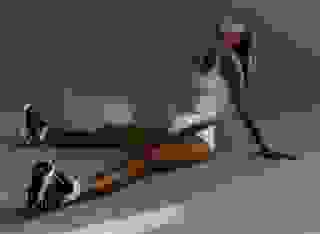Note: You can change font size, font face, and turn on dark mode by clicking the "A" icon tab in the Story Info Box.
You can temporarily switch back to a Classic Literotica® experience during our ongoing public Beta testing. Please consider leaving feedback on issues you experience or suggest improvements.
Click hereDivorce hadn't been easy on him. He didn't want to be divorced, and more than that, he certainly didn't like the idea of rewarding his wife for deciding that he wasn't worth loving anymore because he had spent his life working too hard. He had worked too hard -- he knew that.
Most of that time his job had required him to put in 70 hours a week, except for the two months of the summer when he cut things down to only 50 or so, but the irony was that he had done all that to support Susan and their daughters, and absolutely not because he wanted to.
And when he wasn't working, he was coaching his daughters' youth sports teams or painting some room somewhere in their house whatever new hue his wife had decided had earned its 15 minutes in the interior decorating hall of fame... or cooking dinner... or doing yard work... or....
And all because Susan had quit her teaching job to be a stay-at-home mom a few months before their first daughter Madelyn was born, and without the considerable contribution Susan's salary made to their collective income (she had made a little more than he did), after several years of teaching, he had been forced (very nearly against his will) to go back to school to earn a Master's degree and an Administrative Credential.
With the additional education and licensure, he became a school administrator, and so for 18 years he had labored as a high school principal, a job he came to detest the longer he held it. He had never wanted to be a principal, but Susan had wanted that, and so for almost 25 years his own wishes, not to mention, his own needs, took a backseat to those of the other members of his immediate family.
When their daughters graduated from high school and then college, and then eventually found jobs and lives of their own, Susan was no longer satisfied with a husband who worked his ass off to support her. He had become, she said, "emotionally absent." Her affair started only a month after their youngest daughter Hadley moved away, leaving them "empty nesters."
Pretty soon, he was an empty nester all by himself. Two years ago Susan moved out to join her lover in his fucking, lavish, Manhattan Beach home. She filed for divorce a week later, and the judge ruled that it was his good fortune to be able to share half his salary with her. The only saving grace was that Madelyn and Hadley understood every nuance of the dynamics of their parent's dysfunctional relationship, and they would not forgive their mother's selfishness and deceit. So at least, even if he didn't have any money, he did have his daughters' undying love and affection, something their mother could never again regain.
A little more than year ago, he had informed his school that that year would be his last as principal. His health was a major concern, and he didn't want to die on the job. Now, he was six months into his new life as a semi-retired educator. He had had to petition the divorce court judge to readjust his alimony payments since he had taken a massive salary cut, and though Susan objected, the judge agreed, citing his doctor's assessment of his health as a mitigating factor. Now, the monthly check he wrote Susan was a whole lot smaller than it used to be, and the way he saw it, he at least stood a fighting chance to stay alive until he reached retirement age.
He knew it, knew it like the back of his hand, continuing to be a high school principal would have killed him, literally. He kept having nightmares about someone -- a teacher, a student, one of the janitors, his administrative assistant -- coming upon his dead body at 7:00 in the morning after he'd unceremoniously dropped like the rotted out trunk of an old, oak tree on his office floor the night before.
After he quit, he took on a job bartending at a popular tavern called Fig Hill. It was something he had done when he was in college, so he did have experience in that kind of work. It paid next to nothing, but because he was a full-time employee, it did offer him health insurance. When he wasn't filling pitchers of India Pale Ale for beer-swilling football fans or whipping up Cosmopolitans for 40-something cougars who came to the bar to find someone other than their husbands and ex-husbands to fuck, he wrote for hours at a time and then went for long hikes.
He even fucked a few of the cougars -- the divorced ones; he refused to do to another man what that fucking investment banker from Manhattan Beach had done to him. But after three or four, he knew he could never do that again. With one exception, fucking them was like fucking his wife during their last few years of marriage -- disappointing, humiliating, and, ultimately unsatisfying. Besides his daughters who he loved, but saw only infrequently, the only thing he had left now was hiking and writing.
He had taken up both in the last year before he left education. Even though he wasn't particularly old (he had just turned 50), he was convinced that he was about to die at any moment. And so, already having fully contemplated the decision to leave education, he decided that maybe life without Susan and without a job that he hated even more than he hated her would be worth living.
Instead of letting himself go until he committed a passive form of suicide, which is what he had been doing for at least 10 or 15 years, he thought that seeing his daughters marry, having grandchildren, and doing things that he loved to do but had long ago abandoned in favor of chasing the almighty dollar -- that all those things were worthy of some kind of effort to keep himself alive.
One of those was hiking. There were trails everywhere -- literally hundreds of them -- all within a short distance of his home. He had long liked to walk, but he simply didn't have enough time to do it, much less have a partner with an interest in doing it with him. He decided that he liked hiking a lot. While he walked he thought, and the more he thought, the more he wanted to write down those thoughts.
He also started to eat better, instead of just shoveling bad food into his face as fast as he could because he had so little time, he took the time to make things to eat that were both healthy and inexpensive, and living as he did in the veritable "Salad Bowl of America", there were an unlimited number of fruits and vegetables available year round for next to nothing. Within a few months and almost by magic, he had lost over 50 pounds.
And maybe even more than putting off death for a few more years, he made the conscious decision that his life could never be complete until he found a woman who actually loved him. It wasn't the entire female gender's fault that Susan had been such a bitch, so he decided that he would put himself back out there on the shelf and see if there were any good, decent women that were out shopping for a good, decent man. That, in part, was why he had taken the bartending job. At least he would meet some people.
That was one of the rules he had in deciding to leave education. He wanted nothing to do with the people that he had worked with for all those years. He stayed away from that part of town, and burned all of the bridges with his former colleagues. Not that they had done anything particularly wrong, but he had known some of them for nearly two decades, and he didn't feel as if a single one of them was actually someone he could call a friend.
He had friends -- it wasn't that -- but very few of them lived in California, and so he only saw them once a year or so. Bartending managed to put him in contact with a whole new world of people, and he liked that, like meeting and getting to know new and different acquaintances from divergent backgrounds.
Once he started feeling healthier from all of the hiking he was doing and the more responsible diet he maintained, he had to buy new clothes that fit him, and that made him start to feel younger, more in touch with own body, and more vivacious and virile.
He started to feel as if his wife's unforgiveable deceit had freed him in some way. He hated the divorce, and he wanted to be married, but maybe, just maybe, he was better off without her. That made him happy, and occasionally even made him smile.
And when that happened, other predictable things began to happen as well. He started to notice that more people started to smile back at him, especially women. And the thoughts that he had while he hiked -- all of those thoughts were about women, women he had known, women he saw at the bar or at the grocery store. And while he walked, he imagined situations he had found himself in with the women he had known, conversations that he had with them, and, ultimately, those stories, he decided, were worth telling, even if he was telling them to himself.
That is how he had gotten into writing. For him, walking had begotten writing, and writing was exciting and fulfilling. He wrote fiction, but it was fiction that was born out of his life experiences, experiences that he had once thought so banal and mundane that they could never make for good stories. He had come to believe that he was wrong about that.
Good writing wasn't about exciting events or surreal, otherworldly places. Good writing wasn't about heroic or even extraordinary characters. Good writing wasn't about romanticized plotlines or idealized denouements. Good writing was real. It was true. It was about the banal and mundane, because real life was banal and mundane. Good writing was an expression of what he felt about the real people that he had known, living the actual lives that he had seen them and himself live. Good writing was honest, rather than contrived. That was the bottom line. That, he decided, was what mattered.
And though he suspected that what he wrote was of decent quality -- that it was genuine and authentic -- he only had enough energy to write. He was uninterested in the crass and commercial aspects of the life of writers: the marketing, the self-promotion, the glib and shallow quest for commercial success pursued at the expense of real artistry. It wasn't that he didn't want to be a successful writer, but he wasn't interested in losing his soul to become one.
Plenty of writers he had known or talked to self-published. That was their way of getting their work out there without having to wait around until they were "discovered." He didn't want to go that route. He felt, in some absurd rush of egotism, that self-publishing was beneath him, that it was an acknowledgement that no one else would ever consider his work worthy, and so, he wrote, and then did nothing whatsoever to distribute, much less promote, what he wrote when he was done writing it.
His "Silly Jazz Dude" moment came when he decided that the best thing that could happen was if he died, and when his daughters came, with tearstained eyes, to pour through his effects, they would find everything that he had written and, amazed that their father was, in fact, an overlooked genius, would spend the rest of their lives devoted to the task of promoting his work until those with the power to advocate for him discovered, as they had, the hidden virtuoso that had lived and breathed among them.
That was why he printed and carefully organized copies of every one of his stories, so that they could be found without too much digging when the time came for his abused and disrespected flesh to finally give up the ghost.
He knew that scenario was unrealistic, that it was not unlike the plotline of "Ever After" or any number of Caroline Cole's romantic novels. That it was not unlike Michael "That Silly Jazz Dude" Oleksyszyn's absurd wish to be Sonny Rollins or some dead, jazz genius. He knew that it almost certainly would never happen, but knowing that didn't stop him from wishing that it would.
That was why he had begun to hike and to watch his diet -- ultimately, the reason why he was taking care of himself -- because he now hoped to live long enough to produce something that would live on after him, something transcendent that would perpetuate his spirit, something timeless and eternal.
He knew that was ridiculous, that it was absurd and would never happen, so he decided he would settle for much, much less. He just wanted to live long enough to produce something that was good. Whether he was its only reader or the whole world embraced it really didn't matter. He just wanted to make something good.
And so, with all of these disparate and sometimes conflicting thoughts swirling around in his head, his mind returned to Caroline Cole, "the Queen of Erotic Romance." Why not contact her, and then, let the chips fall as they may? Her Facebook page said that she welcomed feedback from her fans, and so messaging her via Facebook seemed as good a way as any to contact her.
Without thinking about the consequences any more, he wrote a brief and dispassionate message and sent it to her. It read:
Dear Caroline Cole,
I will not hold it against you if you do not remember me, as we did not know each other all that well. That said, I attended Central Michigan University with you many years ago, and when I stumbled across your fan webpage on Facebook today, I was pleasantly reminded of the brief, but enjoyable time we spent together. I was also pleasantly surprised to discover your overwhelming success as a writer, and I just spent the afternoon reading some of your work. My congratulations on your inimitable talent and accomplishments!
If you do, in fact, remember me from our time together back in Mt. Pleasant, I would love to catch up with you. Feel free to message me back if you have any desire to reconnect. I'm looking forward to speaking with you.
Sincerely,
Chris Conway
He did not have much in the way of expectations when he sent the message. For one thing, a fan Facebook page was not the same thing as a personal Facebook page, and he wasn't even sure that Caroline Cole would ever see a message sent to her personally in a Facebook account that, in all likelihood, someone else managed. Besides, even if Caroline did see his message, it was certainly a strong possibility that she would not remember him and would, therefore, have no reason to waste her time trying to connect with someone she had long since forgotten.
He didn't much care for Facebook or any other social networking sites for that matter. He considered the whole social media craze to be patently narcissistic -- a sad commentary on an entire generation's self-absorbed egotism. Though he did have a Facebook account, he didn't have any "friends", and he rarely posted anything to his page. Consequently, there weren't many good reasons for him to log on, and he almost never did so.
On the other hand, he had posted a picture of himself, on the possibility, however slight, that someone he hadn't seen in long while might want to try to talk to him, and because his name was hardly unique or unusual, he figured he had better give visitors to his page some idea of whether or not he was the Chris Conway that they were looking for.
Considering all of those factors, he didn't check back to see if Caroline Cole had tried to contact him for a least a week. When he did check his page, he was stunned. Not only did Caroline Cole write him back, she even remembered him, and by the sound of it, fondly so.
Dear Chris,
It so nice to hear from you! It has been a long time, but of course I remember. I seem to recall a long conversation we had about the Port Huron Statement that first night I met you, and considering the fact that you are the only person (other than Jeffrey "The Dude" Lebowski!) that I've ever known who even vaguely understood what the Port Huron Statement was, your interest in my hometown's history puts you in a singular category! Besides that, I do have vivid recollections of one night in particular that I spent with you.
Thank you for the kind words about my writing. I don't know if my novels deserve such unabashed praise, but I never cease to enjoy hearing people say nice things about me! A long time ago I made the conscious decision to write to satisfy other people, as opposed to myself. It helps to pay the bills, and, surprisingly, much more than that, but despite being a cash cow, it's less rewarding than you might think.
Your message didn't say where you live now, though, for some reason, I am guessing California. You posted a picture of yourself on Facebook posed in Yosemite Valley (what a beautiful place!), so I thought that might be a possibility. I live in L.A. now, so I'm hoping you might be nearby because I would really like to see you!
Wherever you live, I would certainly like to talk sometime. My cell phone number is (310) ***-****. Please feel free to give me a call at your earliest convenience. Thank you for contacting me, Chris! It was good to hear from someone from my past. I so enjoyed reliving the memories of our time together.
Love, Caroline
Reading the message inspired pleasure and excitement, and he couldn't stop thinking about the "vivid" recollection that Caroline had referenced. Did that memory from almost 30 years earlier open a door to a something between them? He began to second guess himself. Caroline Cole was married to a man that was the father of her children. What did a one-night dalliance 30 years ago mean to her in the greater scheme of things? Not too damn much, he surmised. Besides, he hardly considered himself much of catch, considering everything. Why would a "New York Times Bestselling author" bother with semi-retired bartender who fancied himself a writer, but couldn't get anyone to read anything he'd written? She wouldn't bother at all, he assumed.
Still, after reading the message through three times trying to absorb as much nuance as possible, he placed the call.
"Hello," answered a girlish voice bouncing off some unknown cell tower in some unknown place.
"Hello, Caroline? This is Chris Conway. How are you?"
"Chris!" She interjected with genuine excitement. "I was beginning to think that your message was just a tease and that you were trying to make me jealous. You must have reconsidered your enthusiasm about reconnecting, huh?"
"No, no, no! I'm sorry, Caroline. I just don't check my Facebook page very often. I guess I sort of assumed either you wouldn't get my message or you wouldn't remember me, and even if you did remember, I wasn't sure whether or not you'd want to talk to me. I just saw your message a few minutes ago, and then I called right away. I'm sorry I didn't get back to you sooner."
"I understand. I have to say, I was a little disappointed. I thought maybe I had misinterpreted your message, and that you weren't all that excited to talk to me, or at least, not as excited as I was to talk to you! I really did think you were teasing me. You know, trying to make me feel guilty for having let you get away!"
"Having let me get away?" he said it slowly, trying to understand. "What do you mean?" He didn't remember that anything in particular had happened to end their oh-so brief affair. They had slept together one night after a party at his house, and the next morning he had left early to go to work, and he didn't remember seeing her again after that.
That was late in the summertime. He worked at the Mt. Pleasant Hospital that summer. He remembered that he had to report for work at 7:00 a.m. and that he and his best friend and roommate Dean, who also worked there, had left around 6:45 in the morning, and that she was still sleeping. He didn't have the heart to wake her up, so he left a little note on the night stand. If he recalled correctly, it read simply:
Thanks for a great evening, Caroline! I had a really nice time. I don't think I mentioned it to you last night, but I have to work today. Help yourself to breakfast if you'd like. I hope to see you again soon.








